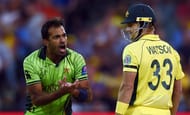
The ICC Cricket World Cup 2015 might not have had the fairytale ending everybody was hoping for, but the Australian team could care less as they were crowned champions for the fifth time. Wrap your head around that fact – five-time winners, having won four times in the past five installments.
It takes a special kind of skill, attitude and culture that moulds Australian cricketers into champions everytime they play on the big stage. While New Zealand were worthy finalists, they were unable to rise to the occasion and we got a one-sided final. That isn’t to say that the tournament wasn’t thrilling.
Over 6 weeks, cricket teams from around the globe (I use the word globe lightly here) gave a wonderful display of their talents as we found new heroes to admire, villains to hate and bid goodbye to some legends. Here’s a look at some of the highlights from the tournament:
Best battle: Wahab Riaz and Shane Watson
When Australia squared off against Pakistan in the quarterfinals, what resulted was a battle for the ages. Annoyed by Shane Watson's jibe at him while he was batting, Pakistan fast bowler Wahab Riaz decided to duel it out with the Aussie batsman in a fiery spell of pace bowling that had everyone at the edge of their seat.
It was cinematic – attack, counter-attack, catch taken, catches dropped, bowler's delight and then anguish interspersed with the batsman's resilience.
Best bowler: Mitchell Starc
I went back and forth between Mitchell Starc and Trent Boult – both produced match-winning performances when their teams needed it the most. They bowled with pace and aggression and are the top two leading wicket-takers in the tournament. And Starc was just devastating.
An average of just over 10 – the best in the tournament for any bowler – coupled with that game-changing wicket of Brendon McCullum in the final meant he was the best bowler of the tournament.
Best batsman: AB de Villiers
This was a slightly more difficult category to decide given the high scoring tendencies of ODI cricket nowadays. While the obvious statistics pointed towards Kumar Sangakkara who finished the tournament as the second highest run-scorer, with the best average and most centuries (4) in the tournament, the Sri Lankan veteran was pipped to the title by South African captain AB de Villiers for one reason – impact.
De Villiers comes into bat much later in the innings when compared to Sangakkara and more often than not scores at a fantastic rate. He finished the tournament with the second highest no. of sixes and never seemed to play for records but for his team.
Best catch: Steven Smith
The standard of fielding in this tournament was high – if you discount Pakistan – who have made a mockery of themselves by dropping lollipop catches in every match. From South Africa’s ground fielding to New Zealand’s dare-devilry, crucial catches proved to be turning points in many matches.
There was Daniel Vettori’s one-handed catch at the boundary line that came out of nowhere and Craig Ervine’s juggling skills to get de Villiers out, but I decided on Steven Smith eventually. Not only did Smith time the dive to perfection, but also reacted to Jos Buttler’s shot in the blink of an eye to take a superb diving catch.
Best fielding display: New Zealand
Had South Africa held their nerve and not made some mistakes in their semi-final clash against New Zealand this title would probably have gone to them. But as it is now, the Blackcaps win this category for their splendid, consistent display of fielding.
They dived and caught the most uncatchable of shots, ran down every ball that headed towards the boundary line. Led by example by Brendon McCulum, they were energetic on the field at all times – even in the final when it would have seemed futile. They were a fantastic team.
Best match: New Zealand vs South Africa
Hands down, the best match of the tournament. The sheer drama in the last overs of the match sent people’s pulse shooting through the roof. The crowd at Eden Park was magnificent – cheering, waving flags, behind the home team but never disrespectful to the opposing team.
When Grant Elliot hit Dale Steyn for a six to take New Zealand home, there was joy around the stadium but South Africa’s players were in anguish. Scenes of Morne Morkel and de Villiers in tears reminded cricket lovers all around the world of the human frailties of cricketers, people who sacrifice their lives to play a sport they love and represent their countries on the world stage. Sport might not always seem fair, but it is still as fair as it gets.
Best act of sportsmanship
Shortly after the semifinal match between South Africa and New Zealand ended, Steyn, who had bowled the last over, fell on his back in despair. Elliot, who is a South African by birth but has called New Zealand his home for more than a decade, reached out to help Steyn onto his feet in a wonderful act of sportsmanship.
While New Zealand cricketers celebrated, they were sensitive in their display and spoke highly of South Africa’s efforts. It is not easy to contain emotions when your team makes it to the final for the first time, but kudos to the Kiwis and the Proteas for proving that while in sport there is always a winning team and a losing team, there are no losers!
Best captain: Brendon McCullum
We saw some good captaincy in the World Cup – Michael Clarke was a master tactician who handled his bowlers well, MS Dhoni came into his own again leading the Indian side to 7 consecutive wins and de Villiers inspired his team to their first-ever knockout win in a World Cup. But, the man who did it all was Brendon McCullum.
Aggressive, bold captaincy where bowlers were used to take wickets and not to contain runs, fielders in the slips to take chances when they presented themselves even if it meant leaving gaps in the field and leading by example – both with the bat and in the field. Adding to that, all those open letters and calls for support were a nice touch.
Best associate team: Ireland
The Irish have knocked at the doors of greatness for a while now. They caused upsets in the two previous installments of the World Cup – beating Pakistan in 2007 and then England in 2011. This time around, they were at the cusp of going one stage further but fell short after losing out to West Indies on net run rate.
They shocked West Indies in their very first group stage match, following it up with wins against UAE and Zimbabwe. While the Irish will rue their missed chances, they have made a good case for themselves and the other associate nations who despite their limitations played with great enthusiasm and spirit.
Biggest shock of the tournament: England
While no one thought England would do very well in the tournament, their absolute demolition in the group stages was unexpected. Losses to Australia and New Zealand were on the cards but it was the meek surrender and lack of resolve shown in the two matches that should have been a warning for things to come.
The loss to Bangladesh which was a virtual knockout match was the last straw as England were sent packing home with just two wins to show. The inventors of the game need a massive overhaul in their cricketing structure, ethos and ODI strategy to recover for the next edition which they will be co-hosting.
Memorable farewells
This year’s tournament saw the retirement of several players – some expected, some not and while Michael Clarke could not have hoped for a better way to finish his ODI career, Daniel Vettori – one of New Zealand’s all-time greats and a personal favourite leaves the game with an impeccable record and an even better reputation.
The tournament also marked the last ODI outing for Sri Lankan stalwarts – Mahela Jayawardene (who retired from all forms of cricket) and Kumar Sangakkara, who have carried the Sri Lankan flag high and mighty for several years now. Sangakkara in particular hit 4 centuries on the trot belying his ageing body but could not take his team further than the quarterfinals.
Misbah-ul-Haq and Shahid Afridi also announced their retirement leaving a huge hole in Pakistani cricket. For better or for worse, Misbah held together a weak batting line-up for the last few years battling intense scrutiny from critics on his personal style with as much restraint as is possible. As for Afridi, he has been a permanent fixture in Pakistan cricket for so long now that is will be strange to not see his name in the playing XI anymore. The game will miss them all.
From seeing Afghanistan, a team that came from a land savaged by war, play their hearts out to watching South Africa, who were once again denied greatness under unfavourable circumstances, ICC World Cup 2015 was memorable in more ways than one. More runs were scored than ever but in the end it was a bowler who was named Man of the Tournament.
While people in the stands jumped at every opportunity to catch one of the sixes, they cheered equally when a fast bowler knocked off the stumps. Bangladesh made history by qualifying for their first ever World Cup quarterfinal, paying back in a sense to their countrymen who have relentlessly supported them for years now while England and West Indies headed back home with several issues to address.
Debates were on and petitions were signed to allow associate nations to participate in the 2019 World Cup while social networks were flooded with cricket analysis. Who said ODI cricket is dead? It may be an old species – fighting for relevance in an era of fast entertainment, but if the 2015 World Cup is any indication, it will evolve and hopefully thrive!
Follow IPL Auction 2025 Live Updates, News & Biddings at Sportskeeda. Get the fastest updates on Mega-Auction and cricket news
